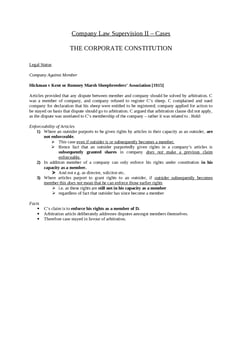Freeman & Lockyer v Buckhurst Properties Ltd [1964] 2 QB 480
Judgement for the case Freeman & Lockyer v Buckhurst Properties Ltd
Table Of Contents
X and Y had formed defendant company, for purpose of selling some land. X, Y and a nominee of both were appointed directors; under articles, all 4 were needed to constitute a quorum.
X spent most of his time abroad, whilst Y undertook day-to-day management of company.
Y decided to develop the land, and engaged Claimant, a firm of architects, to apply for planning permission. Company later refused to pay Claimant on grounds that Claimant had no authority to engage them.
Diplock LJ
-
Is ostensible authority where:
Representation was made to T that agent had authority to enter on behalf of the company into contract of the kind sought to be enforced
Representation was made by a person who had actual authority to manage business of company, either generally or in respect of matter to which the contract relates
-
T was induced by the representation to enter into the contract
I.e. T relied upon it
There were no restrictions in articles of company depriving it of capacity to enter into such a contract
Representation
-
This usually done via conduct
E.g. board of directors appointing Y to a position in which he is permitted to act in management or conduct of company’s business
Here, Y has ostensible authority to enter into contracts which someone in that position would usually be able to enter in course of his duties
Facts
-
Y had ostensible authority to employ Claimant.
-
Board acquiesced to Y acting as managing director in process of finding purchaser for land
Thus represented he had actual authority to enter into contracts of sort which he entered with Claimant (condition 1)
Articles of association gave board full powers of management (condition 2)
Claimant entered into contract on basis of representation (condition 3)
Articles of association did not deprive company of capacity to delegate authority to Claimant (condition 4)
-
For Further Study on Freeman & Lockyer v Buckhurst Properties Ltd
Need instant answers? Our AI exam tutor is here to help.
Ask questions 🙋 Get answers 📔 It's simple 👁️👄👁️
Our AI is educated by the highest scoring students across all subjects and schools. Join hundreds of your peers today.
Get StartedSimilar Cases
Related Product Samples
These product samples contain the same concepts we cover in this case.
| Company Law | Company Contracts Cases (9 pages) |
| Company Law | Transactions With Outsiders Notes (24 pages) |

